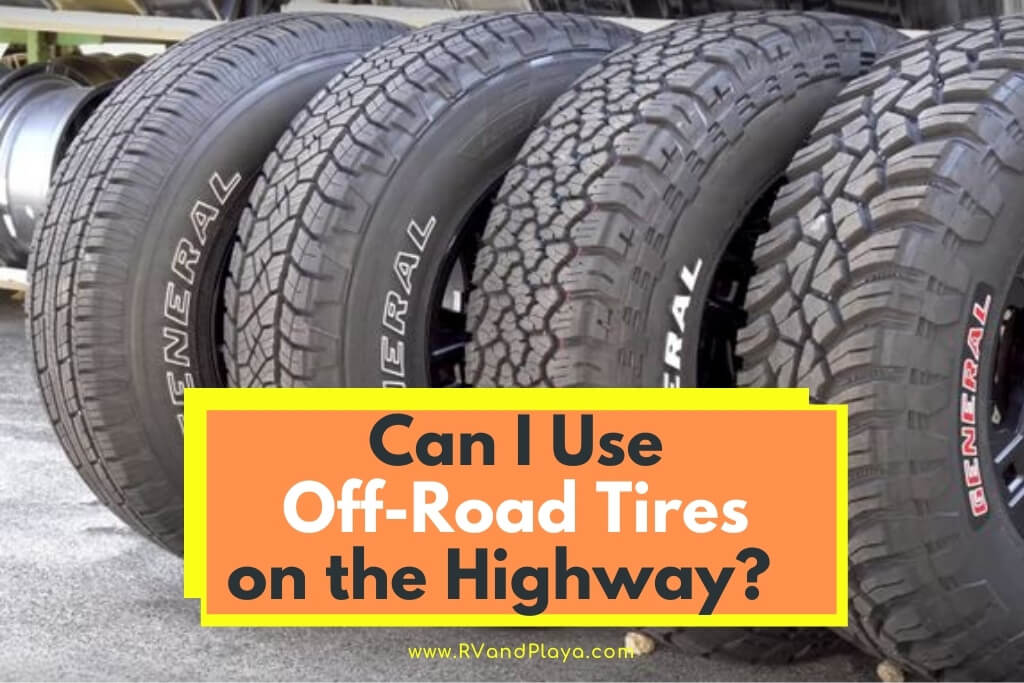If you love taking your 4×4 off-road but still spend some time commuting on the highway, you might wonder if it is safe to use off-road tires.
Although you may legally use off-road tires, and it is quite possible, there are certain disadvantages you should consider.
So, can I use Off-road tires on the highway? Yes, you can use off-road tires on the highway, but it won’t make practical sense if you spend most of your time on the road. Off-road tires reduce fuel economy, are noisy, and wear down quickly, reducing their lifespan. Mud tires may be an uncomfortable ride, be prone to cupping and be unsafe on snow and ice.
If you use your vehicle mostly for exploring uncharted territory and multiple terrains, off-road tires such as mud-terrain tires are the easy choice.
All-terrain tires are a better choice if you spend a fair amount of time on the open road. However, if you wish to use off-road tires on the highway, here are the ins and outs explained.
Table of Contents
Can I Use Off-Road Tires on the Highway?
It is quite possible and legal to operate your vehicle with off-road tires on the highway, and many drivers do. However, it might not make financial sense if your purposes are mostly commuting and traveling on tarred roads.
Mud terrain tires tend to wear down rapidly when used only on the open road and are not manufactured for the heat generated at high speed on tarred highways.
You might find yourself having to replace your tires more often, and your fuel consumption will increase in the case of heavier and larger mud-terrain tires.
All-terrain tires are a better fit if you want to combine off-road adventures with some solid commuting, and you will fare much better. Off-road tires are expensive, and consonant wear from tarred roads might shorten their lifespan.
That being said, if you don’t plan to take your vehicle off-road, it doesn’t make sense to sport a pair of aggressive mud-terrain tires just for asthmatics.
It makes a less comfortable and often noisy ride, and your tires won’t last much over 40,000 miles, according to online estimates.
Read also: Hartland Tires: 9 Facts You Need To Know (Explained)
All-Terrain Tires
All-terrain tires are manufactured for use for both on-road and off-road travel. These tires compromise between grip for loose terrain and safe and comfortable road driving.
Modern all-terrain tires usually have hybrid tread patterns and are made of tougher compounds to resist wear on under mixed surface use.
Manufacturers employ siping, which is thin slits cut or molded into the tread blocks, which increase the tires’ grip on traveling surfaces.
All-terrain tires offer less rolling resistance than mud-terrain tires, reducing their adverse effects on fuel consumption.
Read also: Heartland Tires: 10 Facts Owners & Buyers Should Know
Disadvantages of All Terrain Tires on the Highway
They can be Noisy
All-terrain tires have a block tread pattern that creates more noise if you decide to use them on the highway.
The chunky design of the tires and the increased thickness and size in comparison to road tires make it a somewhat noisier ride. The noise is particularly noticeable on raised vehicles that expose the tires.
Shorter Tread Life
Not quite as soft as the mud-terrain tires, some all-terrain tires wear down more quickly with highway use than on-road tires.
The average life span of all-terrain tires is roughly 40,000 miles compared to the 60,000 miles of an average on-road tire.
This reduced lifespan means costly replacements, which does not make financial sense unless you are also getting good use of them off-road.
Lowered Fuel Economy
All-terrain tires don’t offer the same fuel efficiency as on-road tires but not quite to the extent of Mud Terrain tires.
Experts agree that all-terrain tires used on the highway reduce the vehicle’s fuel economy by about 3% compared to on-road tires.
Mechanical friction, wind, and rolling resistance, and tread patterns all influence your fuel economy.
Mud -Terrain Tires
Mud tire manufacturers create this tire specifically to tackle off-road conditions such as mud, loose soil, and jagged rocks.
The large tread block design offers deep voids between them that can dig into most off-road surfaces, while gaps between the treads clear gravel, mud, and surface debris.
These ties often use a unique design to clear debris that would otherwise lodge between the tread blocks, ideal for muddy or stony terrain.
However, all the features made to make them great off-road tires work against them on the open highway.
Disadvantages of Mud Terrain Tires on the Highway
Mud Terrains Are Prone to Cupping
The aggressive tread on mud terrain tires makes them more prone to cupping.
Cupping is an uneven wear pattern that happens due to irregular up and down wheel motions and interferes with proper contact on the road surface; This action scoops out the rubber spots leading to what is referred to as a ‘scalloped tire.’
Mud Terrains Wear Out More Quickly
In order to give them their grip in uneven terrain, mud terrain tires are typically made in a softer material than all-terrain and on-road tires.
This advantage in muddy terrain is not an advantage on the open road because the tires aren’t designed for continuous high-speed travel.
Manufacturers chose softer compounds that allow the tire to flex and grip, promoting traction, which does not translate well to high speeds on tarred surfaces.
If you spend a substantial amount of time off-road in muddy, even terrain and seldom use your vehicle for road travel, then this tire is the best option.
Mud Tires are Noisy
Although advances in tire technology eliminate many of the mud-terrain tire use issues on the road, generally, these tires generate the most noise.
The wide gaps and massive treads that make mud a breeze are why they make such a noise, especially at high speeds.
The large square treads emit vibration on the highway, similar to a high-pitched hum or drone. Highway tires have chevron or back-angled tread blocks that reduce the acoustic effects of contact with the road at higher speeds.
Anyone will know the experience of the roar of a work truck on a highway with aggressive mud-terrain tires.
They Can Be a Hard Ride
A mud tire rugged, heavy-duty construction adds thickness to the sidewall size; the increase in size creates abrasion resistance and results in a firmer, less comfortable ride on tarred roads.
All-terrain tires have an interlocking tread design that offers a quiet and more comfortable ride on tarred roads.
These tires feature an interlocking tread design that provides the durability to conquer dirt, gravel, and grass, but also offer a quieter, comfortable ride on paved roads
They Aren’t Ideal for Winter
The soft composition of the mud tire that helps the tire grip makes them less suitable for winter. The softer composition of some mud tires tends to freeze and become hard and slippery.
The large tread voids and tread blockers that work to scoop out muddy surfaces tend to impact with snow and make the tire surface slippery.
Conclusion
While there is nothing to stop you from using your mud-terrain tires for your daily commute, you might want to consider another option.
All-terrain tires suit off-road adventures and are more forgiving on the open road.
If you still wish to use your mud tires on your daily commute, expect to replace them quite often and invest in a pair of sound-canceling earphones. You will need them.
Here are some of my favorite tools & equipment´s
Thank you for reading this article. I hope it helps you find the most recent and accurate technical and repair information for your car. Here are some tools that I use as an automotive technician and hope you´ll also find helpful.
There are affiliate links, so if you do decide to use any of them, I´ll earn a small commission. But in all honesty, these are the exact tools that I use and recommend to everyone, even my own family. (NO CRAP)
To see all my of most up-to-date recommendations, check out this resource that I made for you!
References
https://en.wikipedia.org/wiki/Off-road_tire
Recent Posts
There can be a tendency to try and drive with RV tires as long as possible. After all, at an average of around $300 each, getting replacements can be quite a costly proposition. However, due to...
In 2017, it was estimated that nearly 10 million families owned RV’s, with many other families looking into financing or purchasing one in the near future. Clearly, having an RV is a fairly common...


